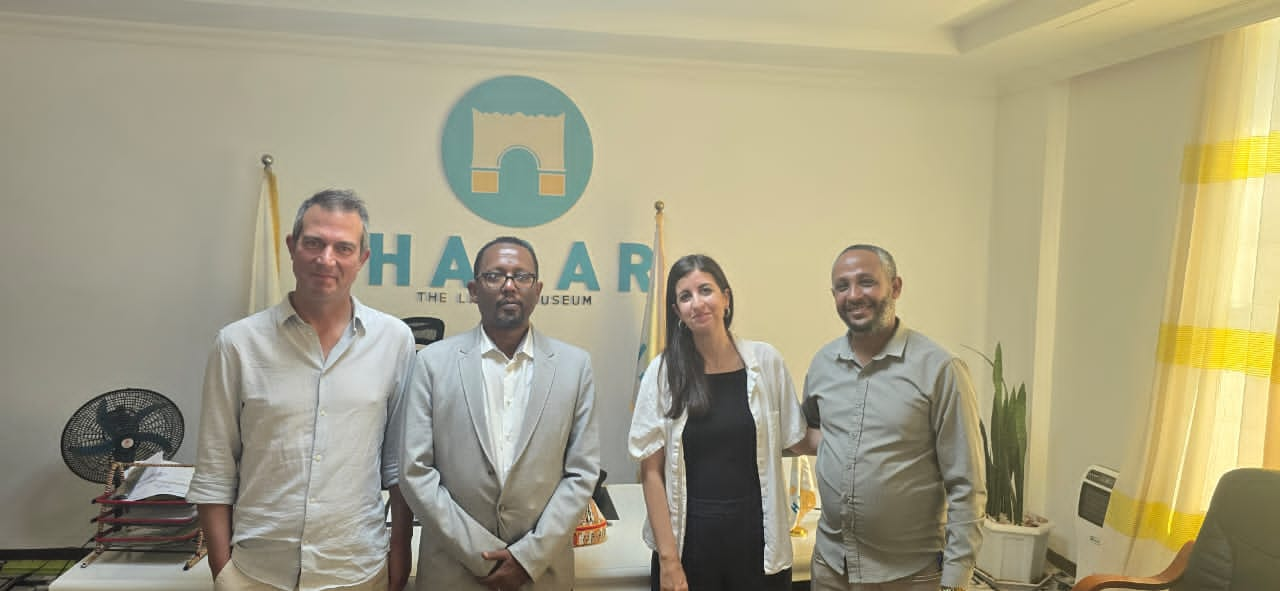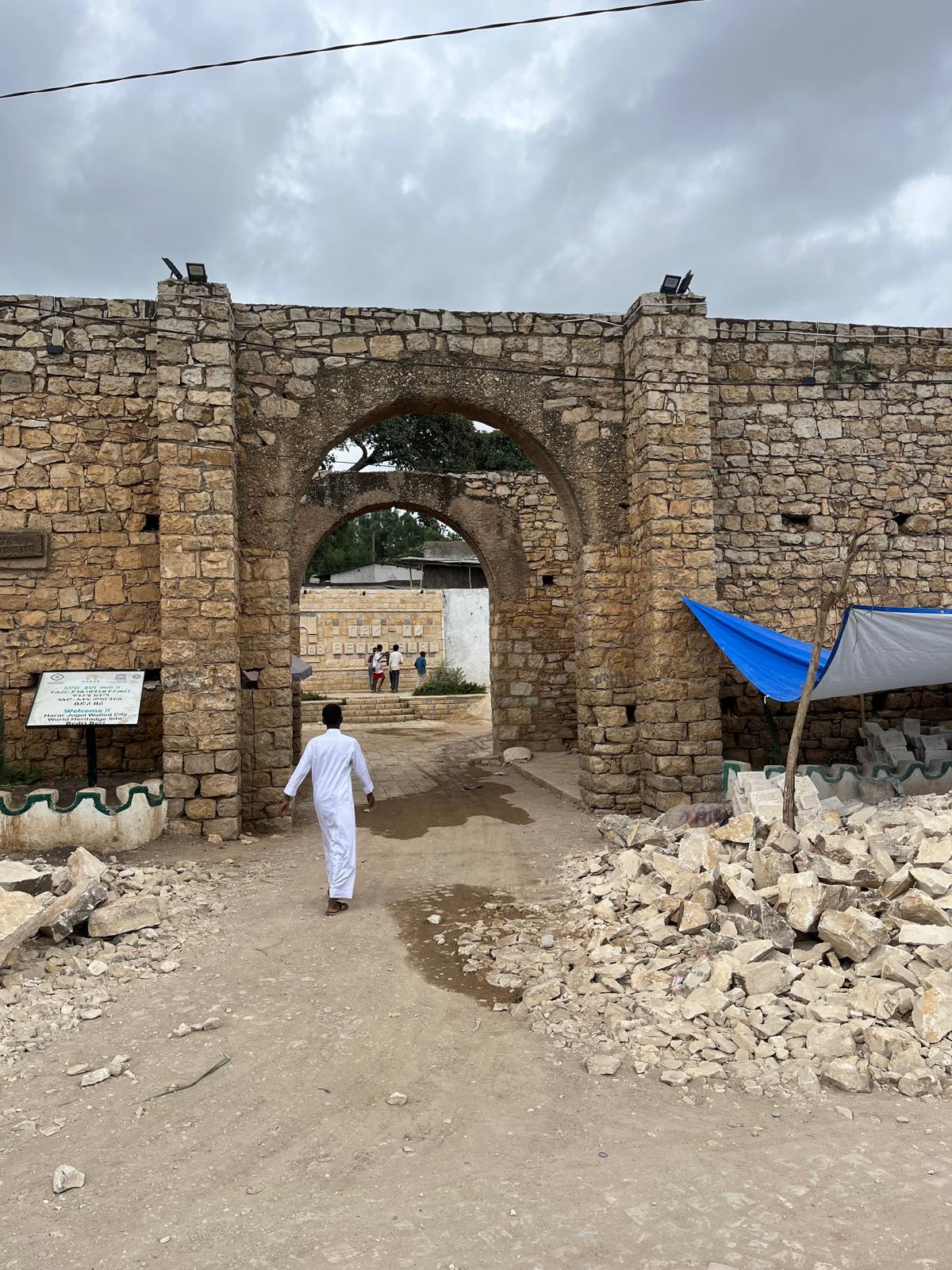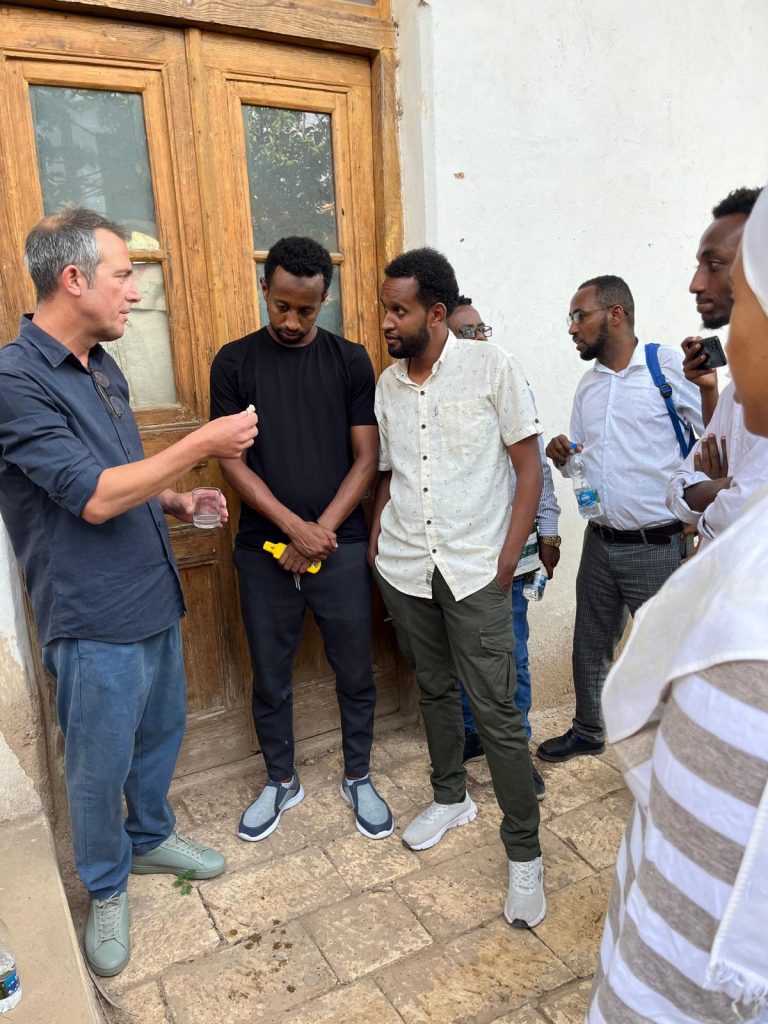Building Local Capacity for Heritage Conservation in Harar Jugal, Ethiopia
by Xanthippi Kontogianni, Ethiopian Program Manager, HERITΛGE
Harar Jugal, the fortified historic town recognized as a UNESCO World Heritage Site, stands as a living testament to Ethiopia’s rich cultural and architectural heritage. With its intricate alleyways, traditional Harari houses, centuries-old mosques, and lively open markets, Harar has long served as a cultural and commercial melting pot. The town holds immense historical value while simultaneously serving as a vibrant home for its local community. However, the preservation of this unique urban landscape is increasingly threatened by urbanization, inadequate maintenance, and the impacts of climate change.
To both leverage Harar Jugal’s potential for the benefit of its contemporary inhabitants and safeguard the historic center for future generations, there is a pressing need to develop specialized skills in heritage conservation, traditional building techniques, and sustainable urban management. Strengthening local capacity in these areas is essential to ensure that the cultural and historical integrity of Harar remains intact while responding to the evolving needs of its residents.
Walls of Harar Jugal.
In December 2024, the Culture and Tourism Bureau of Harar, one of the key institutions responsible for managing the Harar Jugal historic town, invited HERITΛGE to a virtual meeting. During the meeting, Mohammed Rabi, a representative of the Bureau, proposed organizing a heritage conservation workshop for Bureau staff and close collaborators. In alignment with its mission to train and empower heritage professionals to engage communities in stewarding their cultural assets for greater understanding, sustainability, and economic development, HERITΛGE welcomed the initiative and agreed to deliver the proposed training in Harar.
The workshop on Heritage Conservation was conducted in a blended format, combining online and in-person sessions held on 7-9 and 21-23 May 2025, respectively. This flexible format ensured accessibility while supporting dynamic, participatory learning. The training was led by Alexis Stefanis, Assistant Professor of Architectural Conservation at the Department of Conservation of Antiquities and Works of Art, University of West Attica. The curriculum was structured around three core content areas: General Principles of Cultural Heritage Conservation, First Aid for Finds, and Preventive Conservation. The online component delivered core theoretical content through lectures, readings, and discussions, while the in-person sessions emphasized hands-on exercises, group work, and live demonstrations. The workshop attracted 13 participants (8 men and 5 women) and was delivered under HERITΛGE’s HerMaP Ethiopia training program, which is funded by the Humanities in Place initiative of the Mellon Foundation.
 Networking meeting with Mr Teweleda Abdosh Ahmed – Head of Culture, Heritage & Tourism Bureau, Harari People Regional State.
Networking meeting with Mr Teweleda Abdosh Ahmed – Head of Culture, Heritage & Tourism Bureau, Harari People Regional State.
Participant engagement was enthusiastic and highly interactive. The hybrid structure facilitated broad participation, and both components were well-attended. One of the most impactful moments occurred during Dr. Stefanis’s live tool demonstration. After observing how the tools worked and understanding their applications, participants expressed a strong desire to use them directly. Encouraged by the facilitator, they took the tools outside and began applying them at actual heritage sites, collecting data and interpreting results on-site. Many cited this hands-on activity as the most transformative part of the training. Recognizing the value of practical learning, participants formally requested that the tools be made available for their ongoing conservation work.
Dr. Stefanis’s mission to Harar was supported by Natassa Nika, Africa Programs Coordinator at HERITΛGE, and Habtamu Gizawu Tola, HERITΛGE’s local representative in Ethiopia. Together, they met with key stakeholders, including the Culture and Tourism Bureau of the Harari People Regional State, the Construction Permit and Inspection Authority, and the Heritage Department of Haramaya University. These discussions highlighted the urgent need to preserve Harar’s distinctive heritage amid complex challenges. Participants identified priority areas such as capacity building in conservation and digital preservation, community engagement, and institutional strengthening.
These insights aligned with HERITΛGE’s ongoing mapping efforts in Ethiopia. Since launching its intervention program, HERITΛGE has conducted online surveys across the country to assess training needs and identify gaps in heritage management. Findings indicate that many professionals involved in conservation projects lack formal training, especially in areas such as architectural and artifact conservation.
Demonstration of tools.
The workshop and stakeholder meetings in Harar revealed not only the need for training and technical skills but also broader systemic challenges, particularly the lack of funding for project implementation and capacity development. Stakeholders emphasized the importance of collaboration, resource sharing, and establishing equitable partnerships. As a result, HERITΛGE and the Harar Culture and Tourism Bureau committed to ongoing collaboration and began developing a joint action plan.
Brainstorming sessions generated several promising ideas for future collaboration, including co-developing project proposals for funding calls, launching targeted capacity-building programs, and even establishing a university for conservation studies in Harar. As a first step, the partners agreed to draft a series of concept notes collaboratively, with the goal of developing a shared vision that would eventually lead to the signing of a Memorandum of Understanding (MoU) between HERITΛGE and the Bureau—formalizing the new partnership.
Overall, the experience in Harar marked a significant step forward in conservation capacity building and demonstrated the value of inclusive, hands-on training combined with strategic stakeholder engagement. It stands as a strong success story and a foundation for deeper collaboration in the preservation of Ethiopia’s unique cultural heritage.


